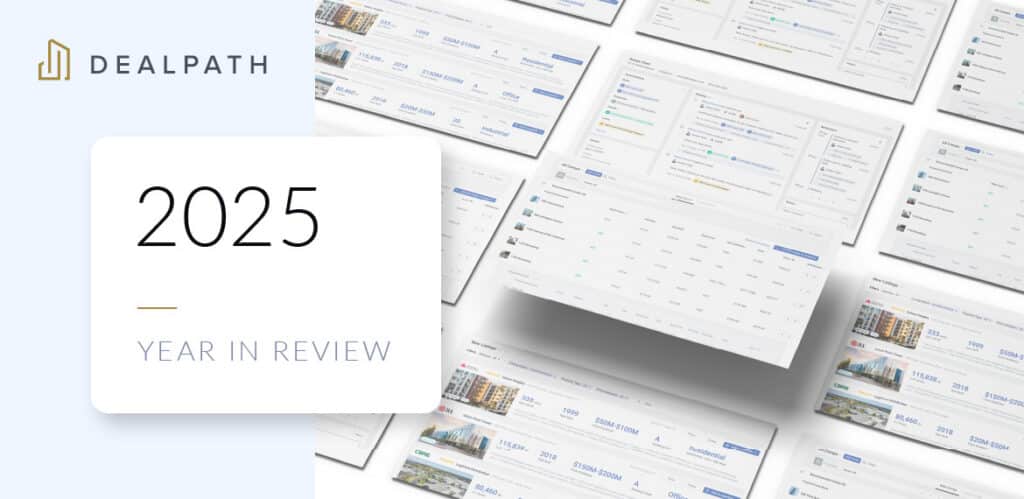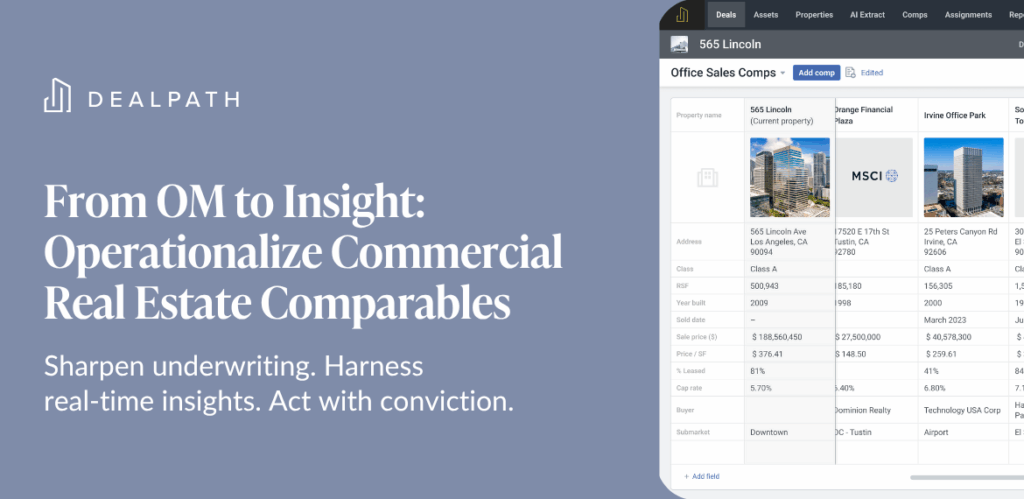At Dealpath, we work with leading institutional real estate investors that manage high-volume pipelines to achieve exponential portfolio growth. Through implementing software solutions tailored to unique enterprise needs, we’ve identified a framework of deal management best practices that firms have followed to drive optimal business performance and unlock maximum portfolio value. Deal management software is anything but a shiny object; achieving growth targets requires organization-wide alignment across data, automation, collaboration and scale, the four pillars of DACS, Dealpath’s deal management methodology framework.
Centralizing critical mass in one purpose-built platform is the only way to gain a competitive edge by closing deals faster and sooner. Read on to learn how your firm can grow its top-line revenue by implementing deal management software and following Dealpath’s proven DACS framework.
Purpose-Built Technology Drives Scalable Growth to Maximize Portfolio Value
Once the tool of choice for preserving and analyzing deal data, spreadsheets have become an unreliable, time-draining tool, often leaving investors with answers in which they do not have confidence. In today’s world, investors should not need to manually cobble together investment committee memo data, model data, and perform other work that could easily be accomplished through simpler, automated means. According to Deloitte, 53% of commercial real estate firms indicated a desire to partner with technology companies, and 32% are restructuring processes based on technology and tools.
Every fragment of data collected by your firm can yield valuable insights, but all too often, teams squander unstructured and omitted data. To deliver on investor expectations, investment managers must lay the right foundations to enable systematic, data-driven decisions informed by historical deals.
Embracing deal management as a strategic business objective is the path forward for investors in a competitive market where speed means everything. The goal of deal management software is not to fundamentally alter how high-performing teams invest in the built world, or challenge investor intuition. Instead, deal management software creates an opportunity to amplify that success with real-time visibility, standardized collaborative workflows and powerful data analytics.
Understanding the Four Key Pillars of DACS, Dealpath’s Deal Management Framework
DACS is a deal management framework that consists of four key pillars, each of which plays an critical role in driving higher returns. The four pillars of DACS are data, automation, collaboration and scale.
By adopting this framework in tandem with deal management software, our customers have achieved impressive business outcomes. For example, by adopting deal management and the DACS framework, one of the top 20 real estate investment managers closed 154% more deals, ultimately deploying 68% more capital.
Data
Real estate investors have always prioritized data, but technology is changing how institutions collect, store and act on it. Data standardization allows investors to easily access and compare data against identically structured data sets. As your firm’s pipeline scales, centralizing real-time data is key to making informed decisions at a rapid pace.
Automation
While technology won’t change the need for intelligent human eyes to review each and every pipeline deal, it can expedite otherwise lengthy processes. Highly paid analysts and associates should not be tasked with administrative work, which often amounts to substantial and tedious data entry. Intelligent automation creates the opportunity for teams to review more deals and prioritize higher-value work.
Collaboration
As deals change hands throughout the asset lifecycle, accessing real-time information is crucial. Collaborating on one platform retains important context for posterity, while standardized workflows make collaboration intuitive, efficient and clear. Even third-party stakeholders like legal counsel, who must contribute integral deal information on nearly every deal, benefit from real-time, centralized collaboration.
Scale
Economies of scale in real estate create a competitive edge for leading firms, but deal management software presents a viable opportunity for smaller firms to operate at the same scale. Standardizing investment workflows in deal management software with actionable, real-time analytics allows investors to scale strategically and efficiently.
Achieving Sustained Portfolio Growth With Deal Management Software
Individually, various software platforms might address needs from one or even two of these pillars. Project management software simplifies collaboration, and investors have relied on Excel to manage data for years. In a vacuum, though, each piece yields limited value.
Centralizing critical mass is part and parcel of the value that deal management software delivers to firms seeking to achieve efficient, data-driven growth. Working in one platform, even lean teams can intuitively collaborate with streamlined access to actionable, vetted, real-time data.
Deal management software won’t drive exponential portfolio growth overnight. But by laying the right foundations, your firm can boost deal volume and velocity to close more deals, deploy capital efficiently and drive sustained portfolio growth.
To learn about the questions you should ask about deal management software before making a purchase decision, download our free 5-question checklist.
Download Guide



